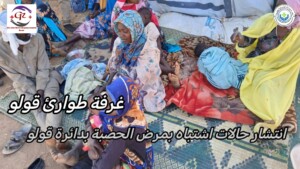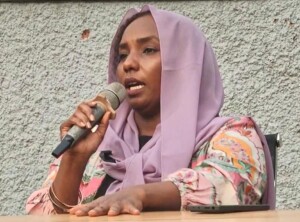Rift Valley fever still rife in Sudan
The Ministry of Health of River Nile state in Sudan reported that four more people have died from Rift Valley fever, and that 132 suspected cases have been registered in the state.
 A child in Sudan receives a cholera vaccine (File photo: Unicef)
A child in Sudan receives a cholera vaccine (File photo: Unicef)
The Ministry of Health of River Nile state in Sudan reported that four more people have died from Rift Valley fever, and that 132 suspected cases have been registered in the state.
The head of the state Health Ministry, Abdelmunim Balla, confirmed in press statements, that the disease spread in El Damer, Atbara, Berber, and Abu Hamad localities.
In mid-October, the federal Ministry of Health reported that the disease spreading in the area north of Berber in the River Nile state is Rift Valley fever.
Hatim Fadul, working for the ministry’s Epidemiology and Emergencies Department, said that the minister had instructed a medical team to investigate cases of high fever in the villages of Artoli, El Bawga, and Fawar on Friday.
The central laboratory in Khartoum confirmed that four out of 17 samples taken last week tested as Rift Valley Fever. Fadul pointed out that the disease is common among people and animals.
Cholera
The World Health Organisation (WHO) has approved a cholera vaccination campaign in three localities in Sennar state, which were not covered by the campaign a few weeks ago to vaccinate wore than 1.6 million people aged one year and above in Blue Nile and Sennar states.
Sennar and Blue Nile state witnessed a significant decline in cholera cases over the past weeks. Health authorities in both states attributed the decline to efforts to combat the disease.
The isolation centre of the Hospital of Singa, capital of Sennar, received one cholera patient this week, after the state had experienced a significant decline in cases earlier this month.
Doctor Mawahib Gismallah, director of Epidemic Control in Sennar, told Radio Dabanga that the recent cholera vaccination campaign contributed significantly to the decline of cholera infection rates in Singa, El Souki and Abu Hujar localities.
She said the state had not seen new cases of the disease in October.
Follow #CholeraInSudan, #ألكوليرا_السودان
Radio Dabanga’s editorial independence means that we can continue to provide factual updates about political developments to Sudanese and international actors, educate people about how to avoid outbreaks of infectious diseases, and provide a window to the world for those in all corners of Sudan. Support Radio Dabanga for as little as €2.50, the equivalent of a cup of coffee.












 and then
and then